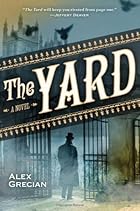This month’s State of the Thing, LibraryThing’s monthly newsletter of features, author interviews and various forms of bookish delight, should have made its way to your inbox by now. You can also read it online. It includes author interviews with Dan Rather, Alex Grecian, Catherine Fletcher, Kathy Hepinstall, and Joy Kiser.
 I talked to Dan Rather about his new memoir, Rather Outspoken: My Life in the News, recently published by Grand Central. Some excerpts:
I talked to Dan Rather about his new memoir, Rather Outspoken: My Life in the News, recently published by Grand Central. Some excerpts:
If you could interview (or re-interview) one person today, and you only got to ask one question, who would you interview and what would you ask?
I would love to know what the Reverend Martin Luther King Jr. would think of the fact that the United States elected an African American president. I would also want to know what parts of his vision for our country remain yet to be fulfilled.
What are your thoughts on the 2012 presidential campaign? Have you been surprised by any of the twists and turns so far, and do you have any predictions about how things will progress over the next few months?
I often say that those who live by the crystal ball learn to eat broken glass. I don’t really know where this election will end up, other than it will almost certainly be close. As for twists and turns, I think that the only people really focusing on that now are an insular press corps and political activists. We’re still in the early innings, but the game has definitely begun. The real question is what will all this money pouring into the process mean for whoever is elected.
Where do you get your news these days? What are the sources you feel most comfortable trusting?
I get my news from many sources. I go online, but I also still love the feel of an old-fashioned newspaper in my hand. I find myself less distracted, and I process what I read more. I have also heard this from many people I talk to, even those raised in the digital age.
Read the rest of our interview with Dan Rather.
 I had the chance to talk with Alex Grecian about The Yard, published by Putnam and a very popular March Early Reviewers selection.
I had the chance to talk with Alex Grecian about The Yard, published by Putnam and a very popular March Early Reviewers selection.
For those who might not have yet had the chance to read The Yard, give us just a short introduction to the book, if you would.
Jack the Ripper has done his nasty work and disappeared. The citizens of London are terrified and they don’t trust their police anymore. The homicide rate is at an all-time high and police morale is at an all-time low, when Walter Day, the newest detective at Scotland Yard, is assigned to catch a cop-killer. Overwhelmed, Day turns for help to an eccentric doctor named Kingsley who is well on his way to becoming the first forensics scientist in England.
What first interested you about the post-Jack the Ripper period in London police
history?
The actual Ripper murders have been talked about to death (so to speak). Jack the Ripper’s fascinating, of course, but I don’t feel like there’s much left to say on the subject. At least, not by me. But the impact he left on the people around him had to have been enormous. Something that devastating and that frightening doesn’t happen in a vacuum. He didn’t kill those five women, and then disappear and life went back to normal for everyone. He permanently changed London—and the world—and that is fertile ground for an entire series of stories.
This is your first prose novel. What was your favorite part of the writing process?
And which part did you like the least?
I had originally intended to write this as a graphic novel and already had some interest from comic book publishers. I’m more comfortable writing prose than I am writing comic books, but it was still a huge gamble to write it as a novel. In the end, I’m very glad I did, but I didn’t know what would happen as I was working my way through the book. It was a little scary.
Read the rest of our interview with Alex Grecian.
 I also talked with Catherine Fletcher about her first book, The Divorce of Henry VIII (published in the UK as Our Man in Rome), released last month by Palgrave Macmillan
I also talked with Catherine Fletcher about her first book, The Divorce of Henry VIII (published in the UK as Our Man in Rome), released last month by Palgrave Macmillan
Tell us about “our man in Rome.” In a nutshell, who was Gregorio Casali, and what did he do?
Gregorio Casali was Henry VIII’s resident ambassador at the papal court in Rome throughout the six years of negotiations over Henry’s divorce from Catherine of Aragon. He came from an upwardly-mobile Italian family whose sons made their way in life through military and diplomatic service to foreign princes. He was the man who did the ‘fixing’ for Henry in Rome: from entertaining cardinals to bribing secretaries, from intercepting letters to kidnapping enemy agents.
Do you recall what first interested you in Tudor diplomacy generally, and in Gregorio Casali specifically?
I had been on holiday to Florence and had got interested in Renaissance Italy. Shortly afterwards I was reading the classic biography of Henry VIII by J. J. Scarisbrick. He mentioned the role of the Casali family in Henry’s divorce negotiations, and I was intrigued by how an Italian family could have got involved in something we in England often think of as a very English bit of history.
I also asked Catherine what books she’s read and enjoyed recently.
I’m reading Thomas Penn’s Winter King at the moment—it’s a marvelous take on Henry VII, a Tudor monarch we often don’t hear much about. And I recently finished Iain Pears’ historical novel Stone’s Fall—an absolutely brilliant murder mystery.
Read the rest of our interview with Catherine Fletcher.
 I chatted with Kathy Hepinstall about her fourth novel, Blue Asylum, just out from Houghton Mifflin Harcourt. I asked about some of her fairly unorthodox outreach efforts:
I chatted with Kathy Hepinstall about her fourth novel, Blue Asylum, just out from Houghton Mifflin Harcourt. I asked about some of her fairly unorthodox outreach efforts:
I read through your author blog to prepare for this interview (and I have to say it’s one of the funniest things I’ve read in a long time). Did you really bury a copy of your novel for Oprah and then provide directions to the buried novel in the local paper? … also, has Oprah retrieved her book yet?
Ah, thank you. And, yes I actually did bury a copy of my novel for her and then took out an ad with a map in her local paper, The Montecito Journal. Oprah did not retrieve the book, although someone did steal her shovel. So I took out another ad, this time hiding the book in a safe by the side of the road with a sign pointing to it that said “Oprah’s Book.” Non-Oprahs of Montecito were instructed, on their honor, not the memorize the combination to the safe included in the ad. Someone heisted the book, the safe and the sign. What can I say? Montecito apparently is swarming with thieves.
You’ve done some other, shall we say, unconventional things to promote Blue Asylum. Describe a few of those, if you would, and tell us about any responses you’ve gotten.
Let’s see, some ad students in Eugene came up with the great idea themselves to write letters from the characters and include them with the galleys that Houghton Mifflin Harcourt sent to the independent bookstores.
I commissioned someone to bake a box of delectables and send it to Books-a-Million with the idea that this was a bribe from the inmates of Sanibel Island to get them out of the asylum. They are getting that soon. Also, we have a web site called whoscrazier.com. You can put any celebrity you want in there, virtually, and hear an audiotape in their own voice that demonstrates why they should be in an insane asylum. And, of course, the Oprah ads. Houghton Mifflin Harcourt has been very open to my ideas, and have some very imaginative ones of their own. Who knows what will work in what way, but I inscribed the latest book (in the safe) to Oprah with the words: “If you never get this book, I still believe in magic.”
Read the rest of our interview with Kathy Hepinstall.
 Finally, I the chance to interview Joy Kiser about America’s Other Audubon, published by Princeton Architectural Press. The book is an an introduction and partial reprint of a rare book of ornithological artwork. A few snippets:
Finally, I the chance to interview Joy Kiser about America’s Other Audubon, published by Princeton Architectural Press. The book is an an introduction and partial reprint of a rare book of ornithological artwork. A few snippets:
What first got you interested in Illustrations of the Nests and Eggs of Birds of Ohio? What attracted you to the book, and what surprised you the most as you researched its history?
When I walked into the Cleveland Museum of Natural History in Ohio to begin my new position as assistant librarian, volume one of Illustrations of the Nests and Eggs of Birds of Ohio was exhibited in a Plexiglas display case at the foot of the stairway that led to the library on the second floor. A label, about three inches high by five inches wide, succinctly explained that the book was the accomplishment of the Jones family of Ohio: the daughter, Genevieve, had conceived of the idea and had begun drawing and painting the illustrations with the assistance of a childhood friend; the son, Howard, had collected the nests and eggs; the father, Nelson, had paid the publishing costs; and after Genevieve died, the mother, Virginia, and the rest of the family spent eight years completing the work as a memorial to Genevieve.
Do you have a couple favorite plates that you’d like to mention?
Plate 2, the Wood Thrush; and Plate 17, the Catbird. I am partial to the American Robin and its stunning blue eggs. That was one of the first birds I learned to identify and interact with in my father’s orchard. It was much more exciting to find blue eggs (like a piece of the summer sky) in a nest than the white eggs with brown spots that the House Sparrows laid.
The first image I saw from Gennie’s book was the Wood Thrush nest with blue eggs reminiscent to the Robin’s but from a bird I have never seen or heard in person. And I am especially fond of Virginia’s composition for the Catbird nest.
America’s Other Audubon is a beautiful book itself: can you tell us a bit about the design and editing process?
Several years ago (2004), The Smithsonian Institution Libraries created a web exhibit that featured an essay about Gennie’s book and included scans of 30 of the color plates and for the very first time people searching the internet from any place in the world had access to some of the book’s illustrations. It was on that website that Acquisitions Editor, Sara Bader, from Princeton Architectural Press discovered Gennie’s art work and realized what a wonderful book it would make. Fortunately, her publisher had faith in her vision and agreed to publish the Jones family’s story and all of the art work from the original book. And the Smithsonian Institution contributed high resolution scans from one of their copies of Illustrations of the Nests and Eggs of the Birds of Ohio.
The difficult part for me was to have to see the field notes reduced to so few words.
Read the rest of our interview with Joy Kiser.
Catch up on previous State of the Thing newsletters.
If you don’t get State of the Thing, you can add it in your email preferences. You also have to have an email address listed.









